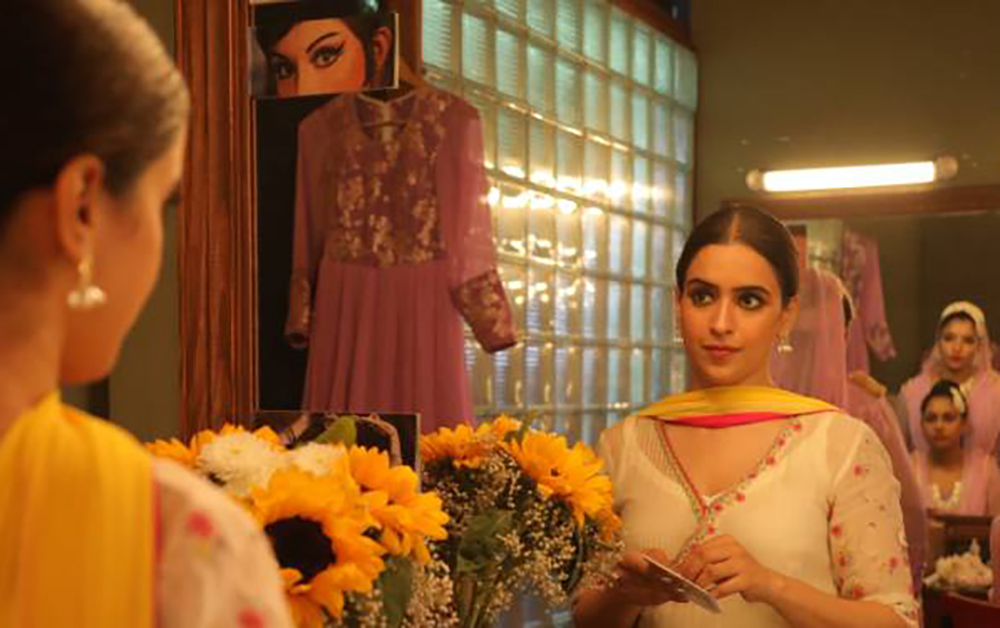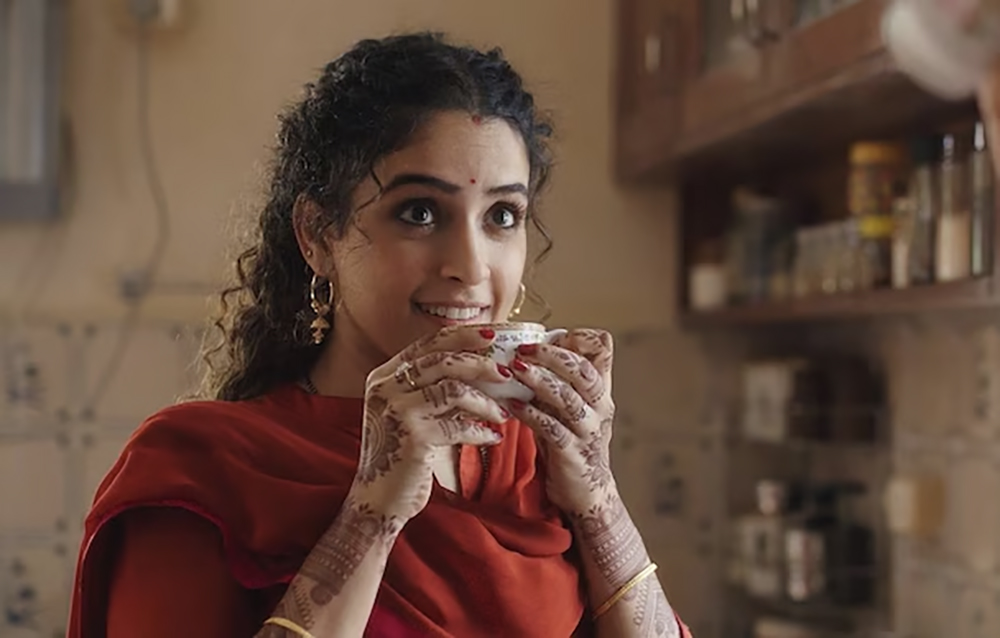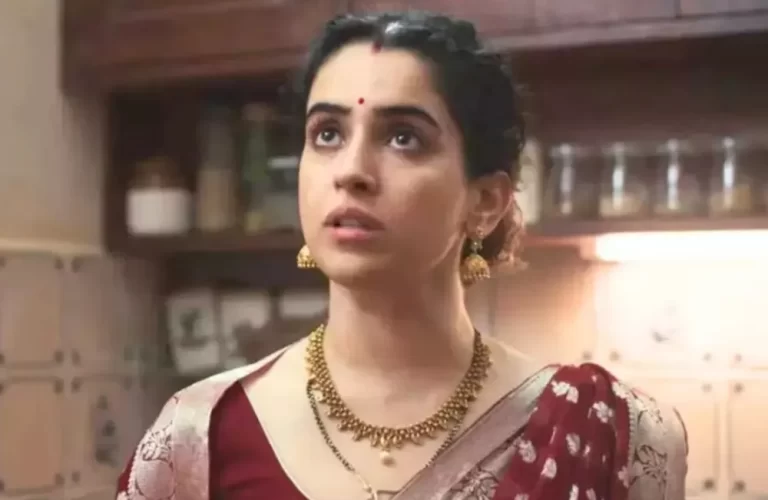In Arati Kadav’s “Mrs.,” after instantly hitting it off with each other, Richa (Sanya Malhorta), a professional dancer, weds Diwakar (Nishant Dahiya), a male gynecologist. While the menu at their reception features more sweetmeats than savoury food, the marriage is a bitter and toxic experience for the new bride. Richa—who is initially impressed by her husband’s choice of profession—soon realizes that his understanding of the fairer sex is limited to just their anatomy. Along with the rest of his conservative family, Diwakar displays alarming levels of sexism, even if it is rather covert.
In this household, the adage ‘Till death do they part’ signifies a metaphorical death by languishing in a kitchen and via archaic fasting practices that only apply to the women in the family. Richa is soon robbed of a social life and stuck in an endless cycle involving long hours of being cooped up in the kitchen. This is as well as later the courtyard that houses her father-in-law Ashwin’s (Kanwaljeet Singh) prized home appliance, old-fashioned mortar and pestle (the man eyes the modern, more efficient electric grinder/mixie with derision). Ultimately, the monotonous, grating routine—coupled with emotionally unavailable relatives who pass venomous backhanded compliments at her unfamiliarity with housekeeping—results in mental turmoil for Richa.
A Solid Remake
Director Arati Kadav makes this remake of the critically acclaimed and beloved Malayalam movie “The Great Indian Kitchen” her own while retaining the flavours of the original: namely its authenticity, charm, and slow-burn storytelling. “Mrs” is also a polar opposite of “Tarla,” the 2023 biopic on legendary Indian chef and cookbook author Tarla Dalal, which upturned the saying “Behind every successful man there is a woman” by portraying both Mrs. Dalal and her husband Nalin on equal footing. The latter selflessly supports his wife’s culinary dreams and acts as an integral part of her success story.
Richa’s situation on the contrary is far harsher and reflects a reality faced by countless women who are driven by passions but are instead tasked in serving demanding in-laws and husbands alike. In this, a woman’s needs are secondary or even viewed as a setback, with both Richa and her mother-in-law Meena (Aparna Ghoshal) perceived as ‘dishwashers’ and ‘baby-making machines.’ As the movie progresses, “Mrs” subtly highlights how women in the household are viewed as easily replaceable. In the absence of Meena, either an aunt, a female domestic helper, or Richa herself are tasked in running the kitchen.
Themes of Patriarcy and Marriage

The running themes of patriarchy and double standards are conveyed through parallels such as a comparison drawn between the newlyweds consummating their marriage while an exhausted Meena scrubs away at the dirty dishes in the kitchen sink. She is the last to turn in for the night. This scene particularly depicts how cooking— which was once an act of affection—has now grown into a chore that’s completely consumed her. Later, the overpowering stench of stagnant water overflowing from a bucket under the kitchen sink (due to leaky plumbing) is also associated with Richa and Diwakar’s equally suffocative marriage. The bucket is in itself a clever ‘Chekhov’s gun,’ planted to go off in a gratifying final act.
“Mrs” also effectively portrays the irony of women tackling multiple jobs much like a goddess equipped with multiple arms, yet are never treated with the same respect and devotion that one would allocate to a goddess. The beliefs of the household, too, are in conflict. Richa’s in-laws preach about hygiene in the kitchen, sustainable methods of cooking and gastronomic science, but these seemingly progressive attitudes are merely superficial. The family is still beholden to outdated superstition and misogynistic practices. Richa is also in awe of her friend’s marriage, which is as dissimilar as apples and oranges when compared to her own. The latter’s husband is keen on splitting household chores, working around their respective schedules, and even planning meals according to his spouse’s diet!
Sanya Malhorta is a Great Talent

Kadav—who balanced whimsy with bleakness in her debut feature “Cargo”—also utilises a contrasting colour palette to put across the aforementioned themes of ‘Mrs.” The colourful and appetising visuals of home-cooked meals are at odds with the drab environment of the kitchen within which Richa is trapped. Richa is also still a passionate dancer at heart, continuing to practice her dance routines within the kitchen itself, twirling gingerly from one kitchen cabinet to the next. A wholesome scene of the charismatic young woman lending a helping hand to her mother-in-law as they pack suitcases full of homemade goodies for relatives also cuts through the bleak tone of the movie. Later, she also finds an ally in a widowed but upbeat domestic help who belongs to a lower caste and her peppy daughter. This subplot further highlights caste privileges.
Furthermore, “Mrs” serves as not just a celebration of Richa’s unbreakable spirit, but also of Sanya Malhotra’s talents. The actress (a trained dancer, like her character), is incredibly fluid in her facial expressions and body language. This shows as the timid Richa who grows in strength with each obstacle, carrying herself with grace and grit through even the most gutting moments. She is ably supported by co-stars Nishant Dahiya, Aparna Ghoshal, Kanwaljeet Singh, and Nitya Moyal, all of whom play their respective roles with conviction.
Overall, “Mrs” is one of those rare remakes done right, leaving viewers with much to ruminate upon with its powerful message.



